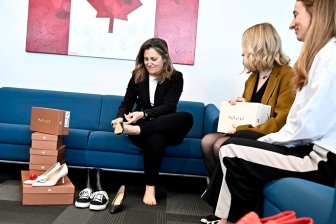Protesting Serbs in the ethnically divided city of Mitrovica in northern Kosovo erected new barricades on Tuesday, hours after Serbia said it had put its army on the highest combat alert following weeks of escalating tensions between Belgrade and Pristina.

Serbia’s defense ministry said that given the latest events in the region and Belgrade’s belief that Kosovo was preparing to attack Serbs and forcefully remove the barricades, President Aleksandar Vucic had ordered Serbia’s army and police to be put on the highest alert.
Kosovo officials have accused Vucic of using his state media to stir trouble and trigger incidents that would act as a pretext for an armed intervention in the former Serbian province.
Petar Petkovic, a Serbian government official in charge of contacts with Kosovo Serbs, told the Serbian state RTS TV that the combat readiness of Serb troops was introduced because Kosovo had done the same thing.
He claimed that heavily armed Kosovo units want to attack the Kosovo Serbs “with the intention of attacking our women, the elderly, children, men. Our people who at the barricades are just defending the right to live.”
Kosovo’s government called on NATO peacekeepers to remove the barricades, but said it had the capacity and readiness to act.
Any Serbian armed intervention in Kosovo would likely result in a clash with NATO forces and would mean a major escalation of tensions in the Balkans, which are still reeling from the bloody breakup of Yugoslavia in the 1990s.
Kosovo remains a potential flashpoint in the Balkans years after the 1998-99 Kosovo war that ended with a NATO intervention that pushed the Serbian troops out of the former Serbian province.
Kosovo and Serbia intend to join the European Union and have agreed, as part of that membership process, to resolve their outstanding issues and build good neighborly relations.
Here are some facts about the standoff:
Why are there tensions?
Kosovo won independence from Serbia in 2008, almost a decade after a guerrilla uprising against Belgrade’s repressive rule.
Serbia, however, still considers Kosovo to be an integral part of its territory and rejects suggestions it is whipping up tensions and conflict within its neighbor’s borders. Belgrade accuses Pristina of trampling on the rights of minority Serbs.
Ethnic Serbs, who do not recognize the Pristina government or Kosovan state institutions, account for 5% of Kosovo’s 1.8 million people, with ethnic Albanians making up about 90%. The Serbs have vented their hostility by refusing to pay Kosovo’s power operator for the electricity they use for example and frequently attacking police who try to make arrests.
Why did tensions flare again?
Fresh ethnic tensions have errupted since Dec. 10 when Serbs erected multiple roadblocks and exchanged fire with police after the arrest of a former Serb policeman for allegedly assaulting serving police officers during a previous protest.
The stand-off comes after months of trouble over the issue of car license plates. Kosovo has for years wanted the approximately 50,000 Serbs in the north to switch their Serbian car license plates to ones issued by Pristina, as part of the government’s desire to assert authority over its territory.
On July 31, Pristina announced a two-month window for the plates to be switched over, triggering protests, but it later agreed to push the implementation date back to next year.

Ethnic Serb mayors in northern municipalities, along with local judges and some 600 police officers, resigned in November in protest at the looming switch.
It is the first time since the recent crisis started that Serbs have blocked streets in one of the main towns. Until now, barricades had been set on roads leading to the Kosovo-Serbia border.
What do the Serbs want?
Serbs in Kosovo want to create an association of majority-Serb municipalities that would operate with greater autonomy. Serbia and Kosovo have made little progress on this and other issues since committing in 2013 to the EU-sponsored dialog.
What is the role of NATO and the EU?
NATO has about 3,700 troops stationed in Kosovo to maintain the peace. The alliance said it would intervene in line with its mandate if stability in the area were jeopardized. The European Union Rule of Law Mission in Kosovo (EULEX), which arrived in 2008, still has around 200 special police officers there.
Reporting by Fatos Bytyci; Editing by Paul Simao, Alexandra Hudson
— With files from The Associated Press





Comments